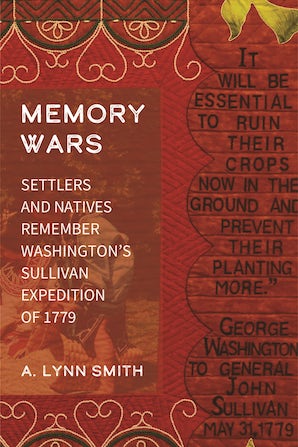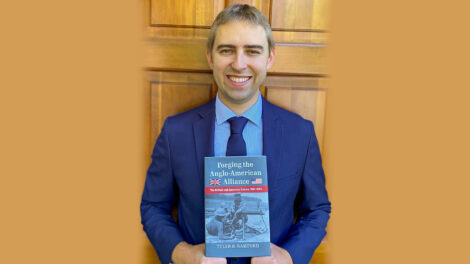Prof. Andrea Smith announces new book, Memory Wars
By Stella Katsipoutis-Varkanis

Photo by Armen Elliott
Andrea Smith, professor of anthropology at Lafayette College
Memory Wars: Settlers and Natives Remember Washington’s Sullivan Expedition of 1779, published by University of Nebraska Press
To be released July 15, 2023
Memory Wars, a summary:
Memory Wars explores why Americans decide to fix historical narratives to the land and considers the consequences of doing so, using markers to a Revolutionary War expedition as its focus. Dozens of historical markers, plaques, and street names in Pennsylvania and New York recognize the Sullivan Expedition (1779) of the Revolutionary War. This expedition was controversial even during the war: It involved the eradication of over 40 Native villages of Britain’s Haudenosaunee (Iroquois) allies. Memory Wars is the first book to take a comprehensive look at this vast commemorative complex.
Memory Wars is divided into three parts: “Origins,” “Reverberations,” and “Interventions.” “Origins,” based on archival research, introduces the reader to the settler-colonial actors and institutions that commemorated the Sullivan Expedition in the 19th and early 20th centuries. Uncoordinated at the federal and sometimes even state level, these actors worked from different scripts and developed distinct accountings of the same military expedition. “Reverberations” moves into contemporary times, revealing how the expedition is viewed by contemporary Native and non-Native Americans living alongside “Sullivan’s Trail.” For Indigenous people whose ancestral homes were destroyed by Sullivan’s troops, the expedition was not a heroic military feat but a genocidal invasion. This wholly different understanding, evident at Haudenosaunee cultural centers, is the subject of part three, “Interventions.”

Memory Wars, published by University of Nebraska Press
Where is it available?
The book is available in e-book and hardcover editions on the University of Nebraska Press website.
Why did you write this book, and why should people at Lafayette and beyond read it?
I am an anthropologist of history and a memory studies scholar with a longstanding interest in the role historical accounts serve in settler-colonial attachments to place. My previous publications considered settler-colonial memories of French settlers of Algeria and of Mormon settlers of Arizona.
I hope this book will be of special interest to residents of Pennsylvania and New York. As the 250th anniversary of the Revolutionary War approaches, historical societies and state historians are considering new, more inclusive ways to commemorate the war, including the Sullivan Expedition. New York is home to many descendants of people whose homes were targeted by the raids. Finding a way to bring these populations together with non-Native Americans to recognize this component of the Revolutionary War will be challenging. Moreover, as non-Native Americans increasingly consider the expedition genocidal at its core, some people are questioning its commemoration altogether. I hope my book will prove useful in navigating these discussions.
How will this research impact your work and/or classroom at Lafayette?
This book had its origins in a class project. In my Social Memory class, which I’ve taught since 2000, I offer a unit on local historical markers. As we surveyed campus markers in 2001, a student brought a Sullivan marker on Lafayette’s campus to my attention, asking why we have a marker “to a massacre in Wyoming” near the Tri-Delta parking lot. Early research into this marker revealed that it was not a one-off project but part of a much wider movement, leading me to the 10 years of research that culminated in this book.
This research has already enhanced my existing courses and has inspired me to develop a new First-Year Seminar on Native American and settler-colonial memory work in the Lehigh Valley.
Is there anything else we should know?
I will be holding a virtual book discussion Aug. 10 at 6 p.m. in partnership with the Sigal Museum and Northampton County Historical and Genealogical Society (NCHGS). The program is free for NCHGS members and $5 for nonmembers. Learn more and register here.

